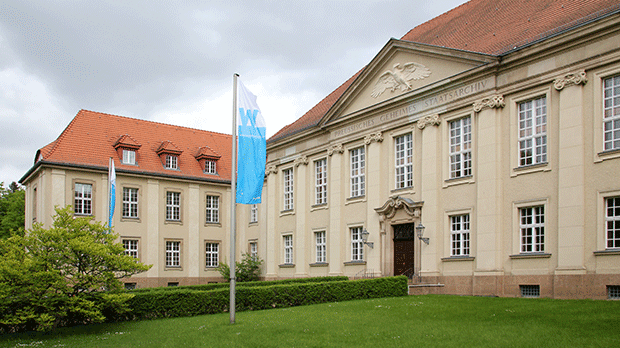Bereichsnavigation
About us
The Prussian Secret State Archives is an institution of the Prussian Cultural Heritage Foundation, a federally incorporated body under public law. Its sponsors include all the German states and the federal government. The Federal Government Commissioner for Culture and the Media is chairperson of the Foundation Board, the Foundation's decision-making body.

The Prussian Secret State Archives (GStA PK) is responsible for the records of the central authorities and institutions of Brandenburg-Prussia, as well as for the archiving of records from the institutions of the Prussian Cultural Heritage Foundation. As the former central archive of the Brandenburg-Prussian state, it has belonged to the Prussian Cultural Heritage Foundation since 1963.
The Prussian Secret State Archives is predominantly an historical archive which, in addition to extensive ministerial holdings and other central records, also preserves archival records from former Prussian provinces, as well as bequests and collections. However, it's activities also encompass the standard processes of modern archival work: It is responsible for records management at the institutions of the Prussian Cultural Heritage Foundation and for curating and creating historical records from their archivable documents.
The Prussian Secret State Archives preserves approximately 35,000 linear meters of archival material ranging from the 12th to the 21st century. The central state government's main historical record generally ends with the year 1933/1934. As a result of the National Socialist "assimilation of the Länder to the Reich" in 1933, the Prussian ministries were largely absorbed into the Reich ministries, so that these records are now located in the Federal Archives.
A Momentous History
Since 1924, the Prussian Secret State Archives has been located on Archivstraße in Berlin-Dahlem in a building constructed especially for its purpose. Prior to that, it had been located in the center of Berlin in the city palace and, as of 1874, in Klosterstraße. As a result of evacuations of archive holdings during the war in 1943/1944 and the interim storage of a large part of its records in the Central State Archive of the GDR (in Merseburg) until 1993/1994, the archive unfortunately does not have its entire repository at its disposal in Dahlem today. Three quarters of the archival records are stored in an external repository in Berlin's Westhafen. Materials from our Westhafen repository can be requested in the research room and are generally available for viewing in Dahlem after one business day.
Visitors to the archive pursue a wide variety of different research interests: International and national historians work in our two research rooms alongside visitors who are passionate about local history or family research, others undertake provenance research, building and monument history, natural regions research, and much more. Archival holdings are made available within the scope of current rules and regulations. These include the Federal Archives Act and the Law on the Establishment of a Prussian Cultural Heritage Foundation, or “Founding Law.” Special devices are available for viewing microfiche and film of media protected for reasons of preservation. Users can take digital photographs of archival material themselves or order high-quality digital copies at a fee from the archive’s Visual Media Department.
About the Collections
The first efforts at archival preservation for the Electors of Brandenburg is documented as far back as the 13th century. Methods applied in the large-scale measures to systematize electoral documents, records and official books in the late 16th and 17th centuries still shape the structure of many of the older collections, for example, the "Privy Council” collection following the pertinence principle. The more recent collections – for example, the extensive records of the Directorate General from the 18th century and the large Prussian ministerial collections of the 19th and early 20th centuries – are arranged using modern archival methods, according to the provenance principle.
In addition to the central state government records mentioned above (Prussian ministries, Directorate General, Privy Council, etc.), other important records of the Prussian Secret State Archives include:
- the archived records of the Prussian Cultural Heritage Foundation (the collections are formed in cooperation with the Central Archive of the National Museums in Berlin, which is responsible for the archival holdings of the museums within the Prussian Cultural Heritage Foundation)
- numerous bequests and collections related to Prussian history (including the extensive "General Map Collection")
- the Brandenburg-Prussian House Archives (the court archives were maintained independently in Charlottenburg Palace from 1848/1851, where they suffered heavy losses in 1943 as a result of the war)
- Parts of the Brandenburg provincial records (the State Archives for the Province of Brandenburg were part of the Prussian Secret State Archivess until 1945)
- large portions of the Königsberg Historical State Archives containing East and West Prussian provincial records, which had been evacuated in 1943/1944 due to the war, and important records of the Duchy of Prussia and the Teutonic Order (the Königsberg archives, which had been stored in Göttingen in the interim, became part of the Prussian Cultural Heritage Foundation in 1966 and was transferred to the Secret State Archives in 1978)
- war-related fragments of records from the former Prussian state archives for the provinces of Pomerania, Posen and Silesia
- diverse documentary material from masonic lodges and comparable organizations
- minor remnants of Prussian military records up to the year 1866 (military archival records were turned over to the, then, newly founded Armed Forces Archives in 1936, which burned almost completely in 1945)

